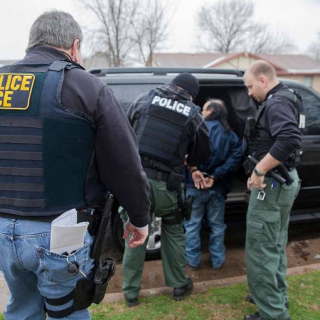Advertisement
First, heartfelt thank you goes out to Mercer County Common Pleas Judge Jeffrey Ingraham for answering prayers for leniency. Wisdom, kindness, compassion. Justice as it should be.
There’s a story here, one that winds through small town America, Halloween, a drug bust, qualifying medical conditions, hostile prosecution, an arduous three years, a half million dollars and justice for patients in the end.
It all began in Rockford, a village of 1,120 people in Mercer County on the far west side of Ohio. White rural Republican red state, it’s a place where miles of soybeans, wheat and corn align razor straight roads. A “Mayberry” of the Midwest.
Ghosts and goblins have been known to haunt Halloween, usually as costumed kids ringing nearby doorbells in pursuit of candy and cookies. A knock on the door of the Keeling family on October 31, 2017, however, took on more ghoulish proportions.
There awaiting Glenn Keeling and his wife Peggysue Kimmel were a legion of police – nine officers from the Mercer County Sheriff’s office, the Grand Lake [Drug] Task Force and the city of Coldwater canine unit – serving a search warrant. And search, they did, allegedly finding hashish within the vicinity of a school (Illegal Manufacture of Drugs – F1 and Possession of Hashish – F5) and the couple’s 14-year old daughter (Endangering Children – F3). In addition, the family possessed their home, $7,295 and 10 guns (six were collectors’ items), all potentially subject to forfeiture. Guns can “aggravate” a charge with an automatic one-year mandatory minimum prison sentence.
The cops arrested Glenn and Peggysue, confiscating their firearms, cash and cannabis, and took Glenn to jail where he remained for 27 days, 5 of them with a paid bond. Thus, began a nearly three-year saga.
The two were arraigned on December 17, 2017, only to have the six charges dropped three months later without prejudice – they could be filed again, which they were on May 21, 2018 via a grand jury indictment. Some say the second time is the charm.
The refiling exemplified gross overcharging. Mercer County Prosecutor Matthew Fox essentially “threw the book” at them. Counts swelled from 6 to 16 for Glenn; 5 to 15 for Peggysue. Eight charges for “Aggravated Possession of Drugs” appeared identical. Possession of hashish was named as a Felony 3, Felony 5 and Misdemeanor. Each charge specified forfeiture of their funds and their home, and each carried 10 gun aggravations – one for each firearm said to “protect drugs and/or proceeds.” Let that sink in: 16 charges equal 16 years for the guns alone. The couple was facing as much as 45 years in prison and $75,000 in fines! Remember, for marijuana.
Some might say that the system had its sights set on the two. Was it because of their cannabis activism?
Both Glenn and Peggysue grew up in Mercer County. They were known faces when Glenn came within 79 votes of winning the Rockford mayoral race in 2015. The couple formed local chapters for West Central Ohio NORML and Spirits with a Vision (SWAV) during that time frame, which seemed to pique the interest of local police. After organizational meetings, officers would pull over cars and press drivers on who was selling what. This surveillance, in conjunction with the Grand Lake Task Force, was documented in an Affidavit on Complaint by a Rockford Police sergeant, which stated, “numerous cars over the last approximately four months have gone to that residence and stayed for a short time, which is consistent with drug trafficking behavior.”
“This is so wrong,” proclaimed Glenn. “No other drugs were found, just a 90-day supply of cannabis for Peggysue and me. We are legal patients! Heck, cannabis resins permitted under the program are essentially hashish.” (Note: The state’s opposition to defendant’s motion to dismiss read, “… raw marijuana alone collected from the Defendant’s residence weighed in excess of 262 grams.” Permitted for one patient under the OMMCP are 226.4 grams of Tier 1 flower. Times 2 patients = 453.6 grams.)
Indeed, both hold physician recommendations under the Ohio Medical Marijuana Control Program, which came of age during their ordeal. Peggysue has been diagnosed with Multiple Sclerosis. Glenn suffers from Crohn’s Disease. Both ailments qualify as medical conditions under the program.
Then, as a surprise to those who have followed marijuana law over the years, Judge Ingraham recognized cannabis as a medicine and permitted its use under the direction of a treating physician as an exception to conditions of bond. Glenn and Peggysue were released on their own recognizance, free to use the medicinal substance for which they were charged.
The case continued over the next two years through pretrial, attorney conferences, motions to suppress evidence, motions to dismiss, requests for additional time and finally the coronavirus, which closed Ohio on March 22, 2020. Upon reopening in mid-May, the possibility of a plea deal turned a pretrial hearing into an attorney conference. The resulting Negotiated Plea Agreement was filed with court on June 29, 2020. Judge Ingraham closed the case with sentencing on July 30, 2020, almost three years after that ghoulish All Hallows Eve. What did Glenn and Peggysue get? Five years of probation, no fines, no time, forfeiture of their cash and firearms, and permission to continue using cannabis under Ohio’s medical marijuana law.
But the question remains why? Why Glenn and Peggysue? Who gained from this hostile prosecution? Was it Prosecutor Fox, seeking to advance his prosecutorial resume as he eyes higher office? Was it whoever now owns a cache of collectable guns? Was it Mercer County residents whose law enforcement officers spent four months surveilling advocates for a legal substance? Was it taxpayers now on the hook for an estimated $500,000 in costs for police, taskforce, drug dogs, and almost three years of court time?
The real winners are the medical cannabis patients of Ohio. Advocates like Glenn and Peggysue fought long and hard to legalize medical marijuana. Their reward thanks to Judge Ingraham is something unheard of 10 years ago: recognition that cannabis itself is no longer on probation – it is a legitimate medicine.



